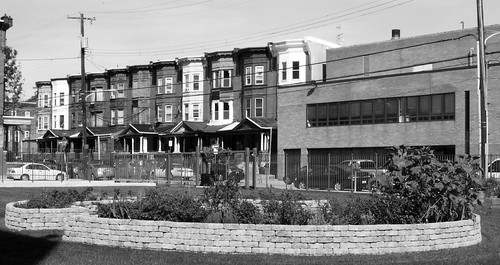
A new garden project at HSC will officially open tomorrow.
Officials will unveil a new garden near the Health Sciences Campus tomorrow, Sept. 28, after collaboration by Temple healthcare students, neighborhood organizations and pharmacy faculty.
What began as an opportunity for pharmacy students to gain first-hand experience with centuries-old natural remedies has blossomed into a three-year community outreach initiative, engaging North Philadelphia inhabitants with a variety of herbs, fruits and vegetables.
Leda Ramoz, a doctor of pharmacy candidate who has led the project since last fall, attributed the success of the Medicinal and Edible Learning Garden to the support of students, volunteers and faculty members.
“I’m very excited for the opening,” Ramoz said. “It will give us the opportunity to display the hard work of everyone.”
The new garden is depicted as a “living museum,” designed to be “educational on multiple levels,” faculty member David Lebo said.
Students from across multiple disciplines at the campus have contributed to the project, with the objective of applying plant species to in-class laboratories and research.
“Our main goal was to get to the root of modern medicine,” Ramoz said. “We have plants here which have been used since medieval times.”
While synthetic medications are prevalent today, many prescriptions contain naturally-derived ingredients. The garden has served as a conversation piece for the importance of conserving medicinal plants.
“One of our concerns is the disappearance of the rainforest,” Lebo said. “You don’t know if a plant has beneficial effects for cardiac disease or diabetes. As much as we think we’re more advanced, we need new ingredients from plants.”
Students conducted extensive research to ensure that all plants were appropriate for an urban ecosystem and did not pose a health risk to gardeners.
The effort was entirely funded through donations by alumni, faculty members and members of the community.
“Everyone’s support has been a blessing,” Ramoz said. “I am proud to say all of the plants have been donated.”
While the project has intrinsic value to budding practitioners, Ramoz also wanted it to serve as a springboard for public discourse on the values and limitations of plant-based treatment.
“People think that natural equals safe. They might not understand that every person has a unique physiology,” Ramoz said. “A major misconception is that natural remedies can’t interact with prescription drugs.”
Lebo said it is often difficult to obtain information about plant-medicine because the Food and Drug Administration imposes little regulatory structure on natural supplements, treating them as food rather than pharmaceuticals.
Students and faculty from Health Sciences Campus further north on Broad Street aim to combat misinformation by encouraging local residents to come with prescriptions on designated days to discuss drug-to-drug interaction.
In addition to medicinal herbs, the collaboration developed produce to fill a local need for access to fresh fruits and vegetables. Parts of North Philadelphia are considered “a food desert,” where fresh, healthy foods are difficult to find, Ramoz said.
“It is definitely an issue not having access to grocery stores. But having worked with various families in the area, I can say with firsthand knowledge that there is a strong commitment to healthy and nutritious meals,” said Dianne Butera, associate director of the Bridging the Gaps program.
The BTG program is designed to link health and social services to underserved communities.
While the garden project promotes pharmaceutical knowledge, on a more fundamental level it allows Philadelphians to gain firsthand insight into the natural world.
Children from local churches and daycare centers have had the opportunity to learn about plant growth through Temple.
“One of the best days of the summer was seeing the local children water and weed the garden,” Lebo said.
The interest of neighborhood residents in horticulture has been piqued by the project, and locals are taking the initiative to contribute, Ramoz said.
“People from the area walk up to us and ask, ‘What is going on? How can I help?’” Ramoz said.
Courtney Thompson can be reached at courtney.e.thompson@temple.edu.



The first new rule says you HAVE to have insurance. Both my husband and I have pre-existing conditions, and although the new bill says we can’t be denied coverage because of it. So far, the cheapest health insurance we’ve been able to find is called “Penny Health” search for it online if you are pre-existing conditions.
people should never forget that real health depends how well you take care of yourself and not what health insurance you carry but I agree health insurance is important for every one. Search “Penny Health” or online for dollar a day insurance plans.
I think more people should get involved like this and work toward bettering their communities. It once was said that If we give more time to bettering ourselves, we would have less time to critcise others”. I’m just saying. Everyone should take a chemistry class and lear how to grow some of their own food. 🙂 Juan K. Ramoz